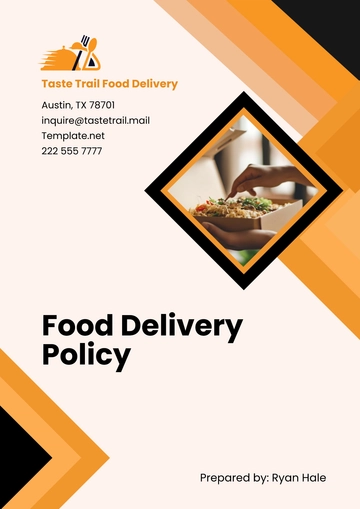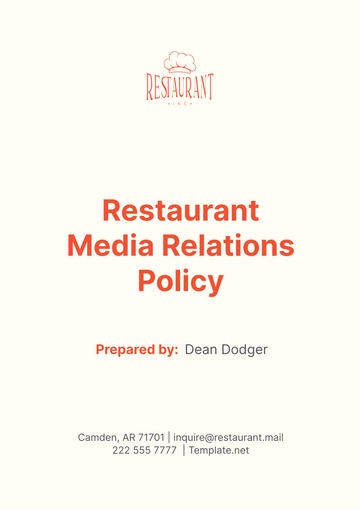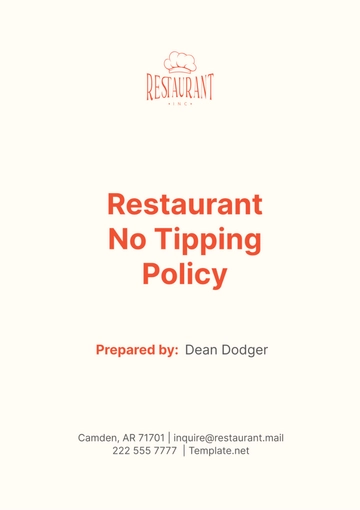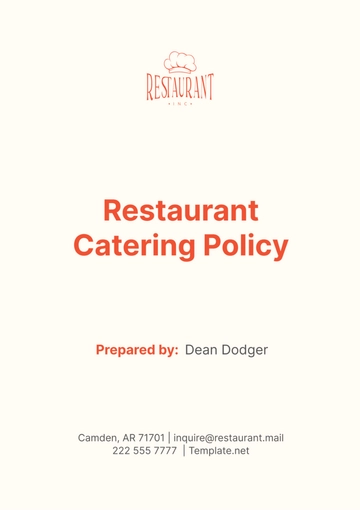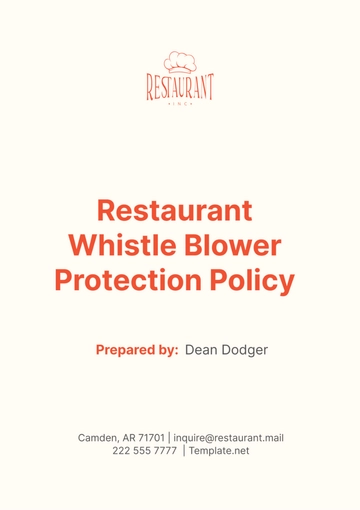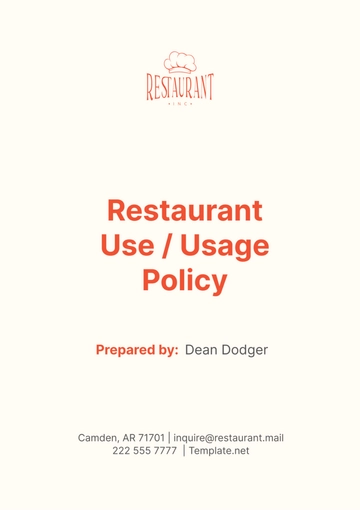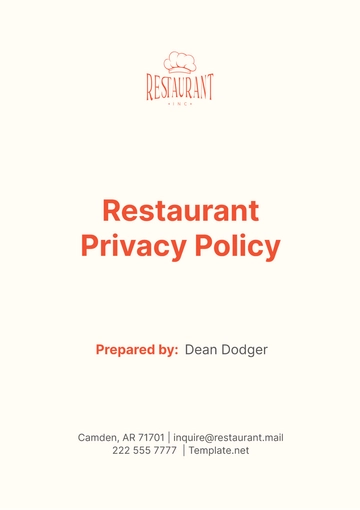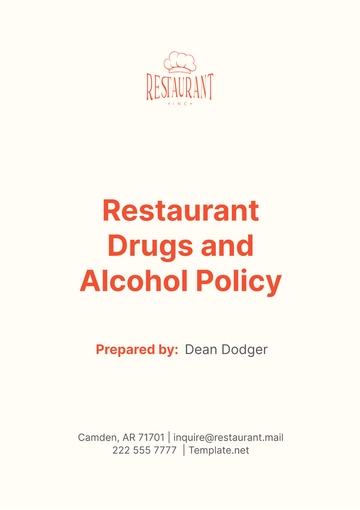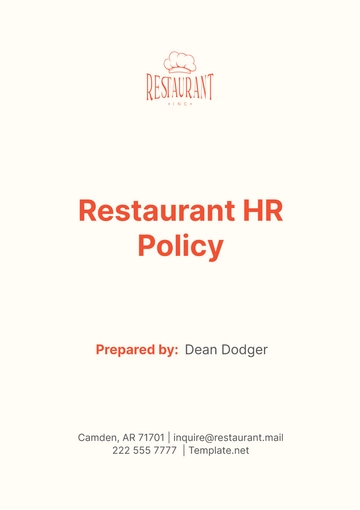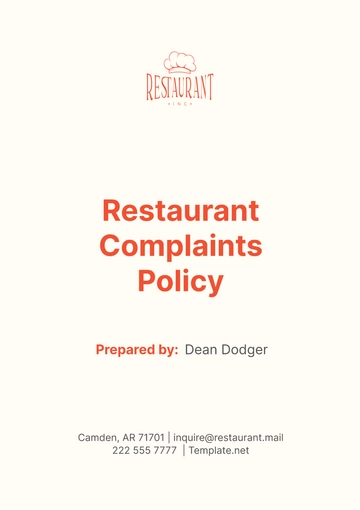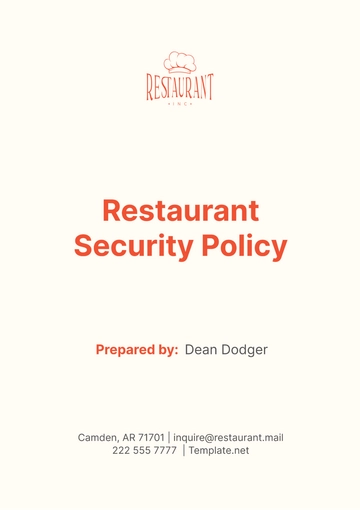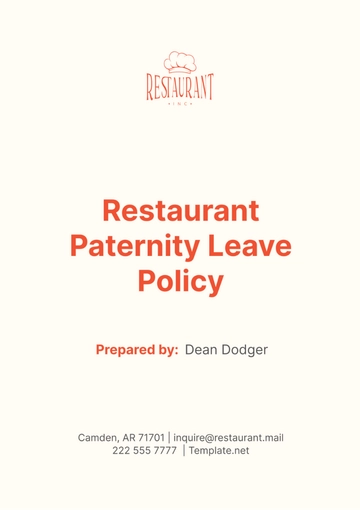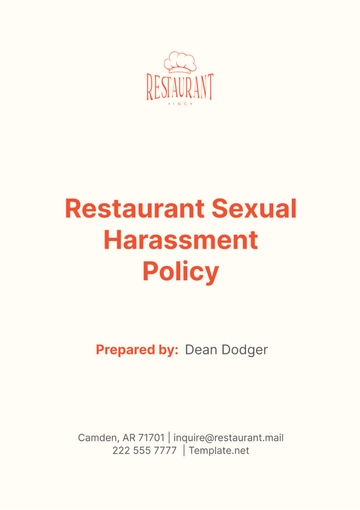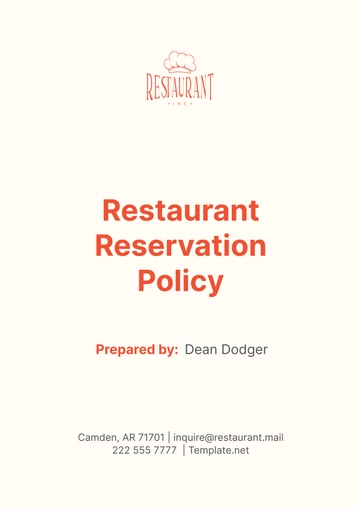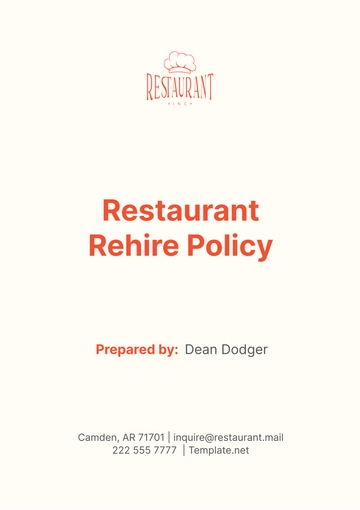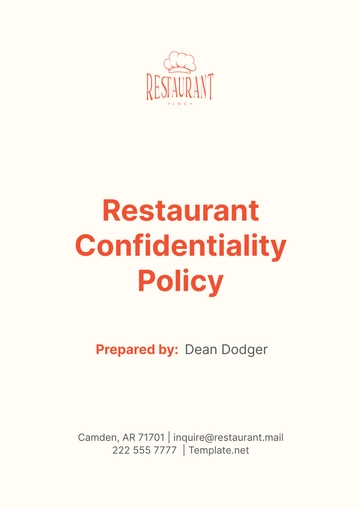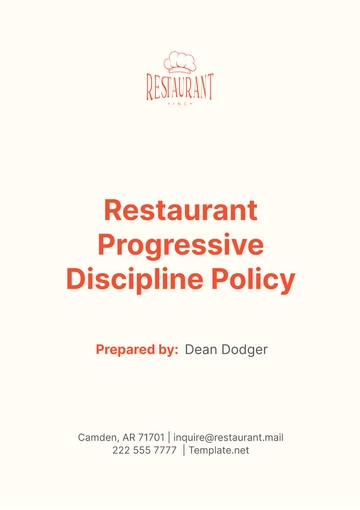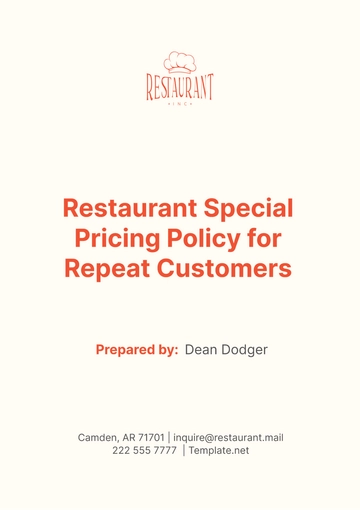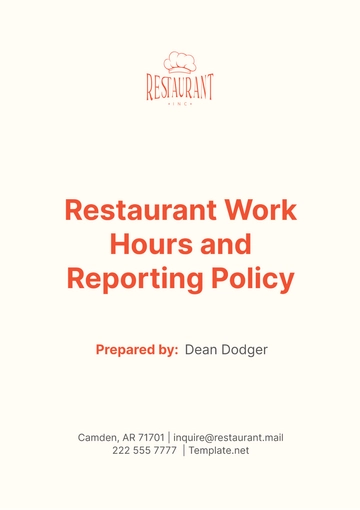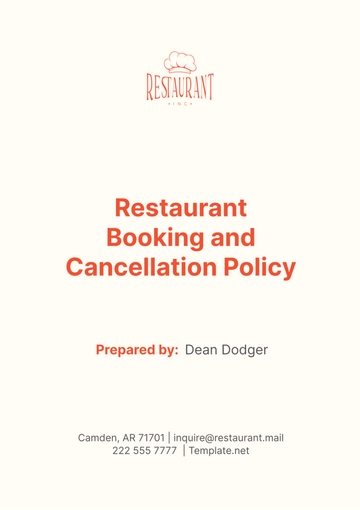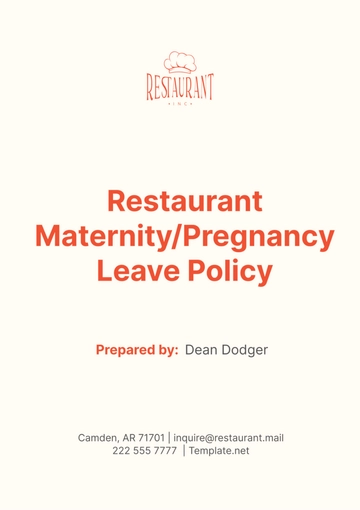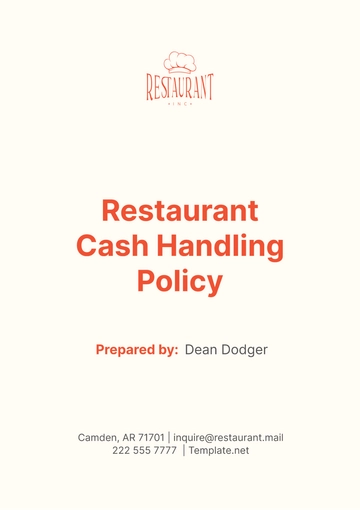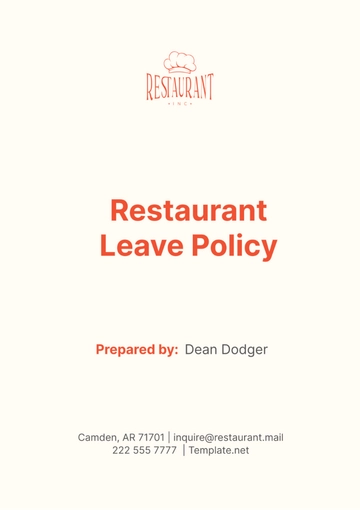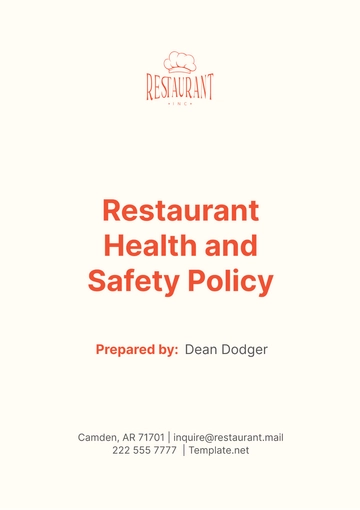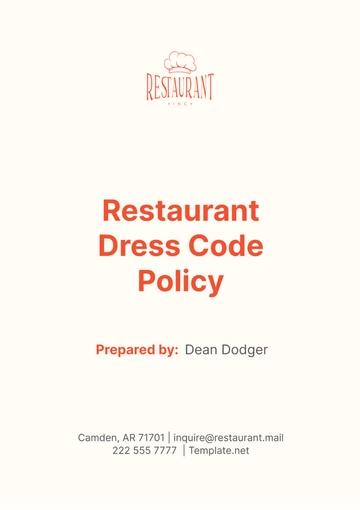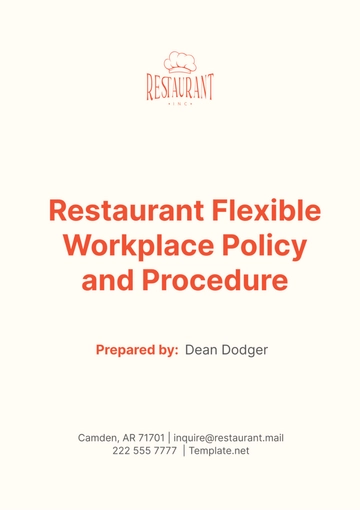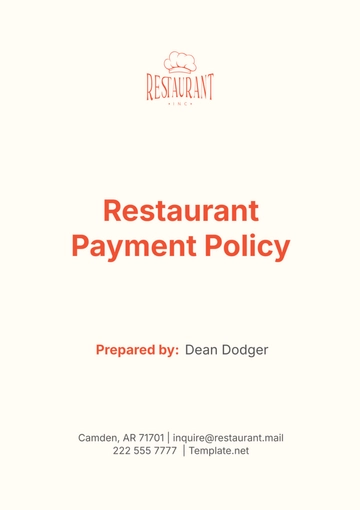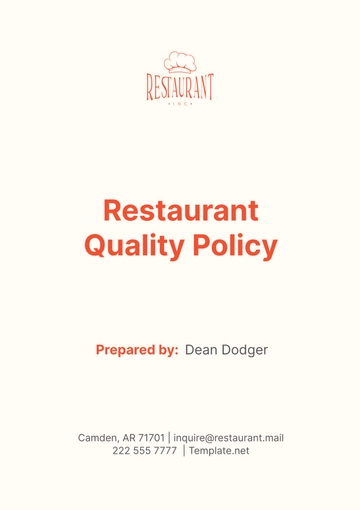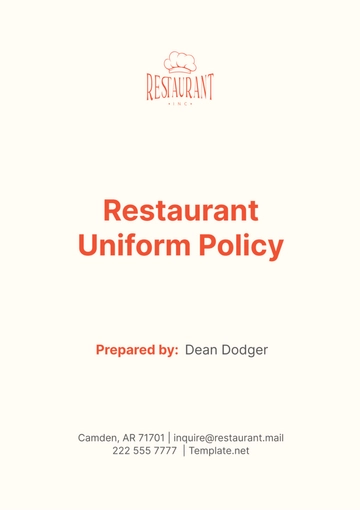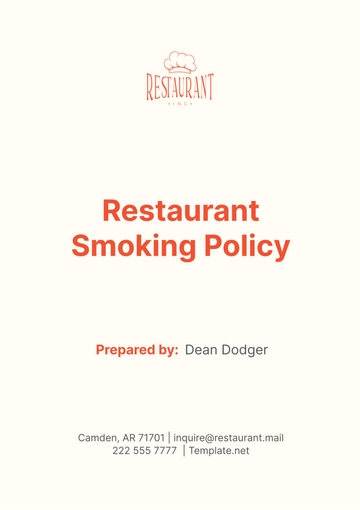Free Restaurant Whistle Blower Protection Policy
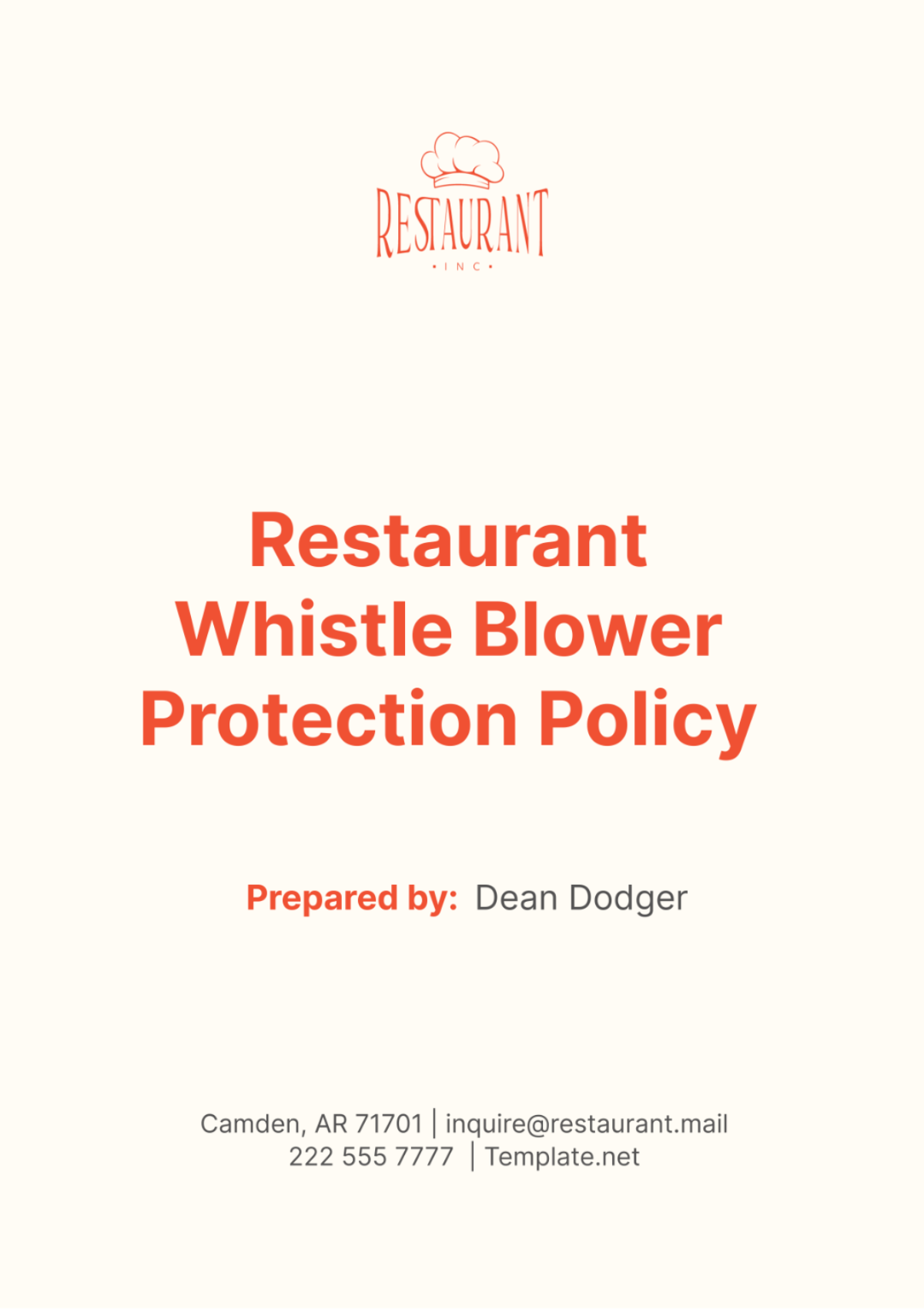
Effective Date: [Month Day, Year]
1. Purpose
The Restaurant Whistleblower Protection Policy is a crucial framework within [Your Company Name] designed to empower employees and associates to report any instances of unlawful or unethical behavior occurring within the restaurant, without the fear of retaliation. The purpose of this policy is to promote a culture of openness and ethical integrity by protecting those who, acting in good faith, disclose activities potentially harmful to the public welfare or detrimental to the integrity of the restaurant.
By facilitating a safe avenue for reporting, the policy aims to detect and prevent illegal or unethical actions early, thereby safeguarding the restaurant's reputation and operational standards. Ultimately, the existence of this policy underscores [Your Company Name]'s unwavering commitment to transparency and accountability, cultivating an environment rich in trust and integrity.
2. Scope
This policy extends to all individuals associated with [Your Company Name], encompassing employees at all levels, contractors, and volunteers, irrespective of their rank or duration of association with the company. It is applicable to a wide array of wrongful conducts:
a. Legal Violations: Includes breaches of federal, state, or local laws.
b. Regulatory Non-Compliance: Encompasses failure to adhere to rules and regulations pertinent to restaurant operations.
c. Corruption and Bribery: Involves any form of corruption, including bribery or other means of illicit gain within the restaurant operations.
d. Fraud and Theft: Covers acts of deceit, such as embezzlement or misappropriation of company assets.
e. Abuse and Misconduct: Relates to abuse of authority at any level, including harassment or discrimination.
f. Public Health and Safety: Concerns any practices that significantly endanger the safety and health of the public, including unsafe food handling and violations of occupational safety standards.
g. Environmental Breaches: Includes significant harm to the environment through non-compliance with environmental laws and regulations.
This comprehensive coverage ensures that employees feel fully supported in reporting a wide range of issues that could negatively impact the ethical fabric and operational efficacy of [Your Company Name].
3. Reporting Procedures
The effectiveness of a whistleblower policy depends significantly on clearly defined and accessible reporting procedures. [Your Company Name] has established multiple channels to facilitate the confidential and anonymous submission of reports by whistleblowers:
a. Direct Reporting to Supervisors or Managers: Employees are encouraged to report any concerns to their immediate supervisors or department managers, unless these individuals are involved in the issue.
b. Dedicated Hotline: A dedicated hotline is available 24/7, allowing employees to report concerns anonymously.
c. Email System: An encrypted email system is available for employees who prefer to submit a written record of their report.
d. Third-Party Service: An independent third-party service can be contacted to ensure impartiality, particularly in sensitive cases.
These mechanisms are designed to uphold the confidentiality of the whistleblower and to protect them from any form of retaliation.
4. Protection Measures
To guarantee that whistleblowers can report wrongdoing without fear of retribution, [Your Company Name] has implemented robust protection measures:
a. Retaliation Protection: Strong anti-retaliation protections are in place, ensuring that any employee who reports wrongdoing in good faith is safeguarded against dismissal, demotion, harassment, and other forms of retaliation.
b. Confidentiality: The identity of the whistleblower will be kept confidential to the extent allowed by law and the nature of the investigation.
c. Support and Counseling: Access to legal and psychological support is provided to employees who may suffer from stress or anxiety as a result of their whistleblowing.
These measures reinforce our policy's intention to foster an ethical workplace and demonstrate the management’s commitment to acting on reported concerns promptly and effectively.
5. Investigation Process
The investigation process at [Your Company Name] is a cornerstone of our Restaurant Whistle Blower Protection Policy, ensuring that all reports of misconduct are addressed with the seriousness they warrant. This process is meticulously designed to be both thorough and impartial, conducted by a designated compliance officer or an appointed investigator, depending on the nature and severity of the report. The steps involved in the investigation process are as follows:
a. Receipt Acknowledgment: Upon receiving a report, an acknowledgment of receipt is issued to the whistleblower within seven business days. This ensures the reporter knows their concerns are being taken seriously and are in the process of review.
b. Preliminary Assessment: The initial step involves conducting a preliminary assessment to determine the validity and scope of the report. This assessment helps to identify the resources and approaches needed for a comprehensive investigation.
c. Evidence Gathering: The investigation includes interviewing relevant witnesses and reviewing pertinent documents and other forms of evidence. This is crucial to establish the facts and gather all necessary information related to the reported misconduct.
d. Compilation of Findings: Once the investigation is complete, a detailed report of findings is compiled. This report assesses the evidence collected and, based on the findings, recommends corrective actions if any wrongdoing is confirmed.
e. Communication of Outcome: The whistleblower is informed about the outcome of the investigation, respecting confidentiality constraints. This communication is crucial to closing the loop with the reporter and maintaining trust in the process.
6. Confidentiality
Confidentiality is a key principle of our whistleblower policy, safeguarding the identity of the whistleblower and the sensitive information disclosed during the investigation. At [Your Company Name], the following confidentiality protocols are enforced:
a. Protection of Identity: The identity of the whistleblower will be kept confidential throughout the investigation process and will only be disclosed to those directly involved in handling the case.
b. Limited Disclosure: Information will be shared strictly on a need-to-know basis with individuals who have a legitimate requirement to be involved in the investigation. This includes the compliance officer, relevant department heads, and legal advisors.
c. Secure Handling of Information: All documents, communications, and reports related to the whistleblowing case are handled and stored with the highest security measures to prevent any unauthorized access or leakage.
7. Training and Awareness
Ensuring that all employees at [Your Company Name] are well-informed about the Restaurant Whistle Blower Protection Policy is fundamental to its effectiveness. Our commitment to training and awareness includes:
a. Regular Training Sessions: We conduct regular training sessions for all employees to familiarize them with their rights and responsibilities under the policy. These sessions cover the mechanisms of reporting, the importance of acting in good faith, and the protections afforded to whistleblowers.
b. Awareness Campaigns: Ongoing awareness campaigns are held throughout the year to keep the policy and its features top of mind. These campaigns use posters, newsletters, and intranet articles to reinforce the importance of integrity and transparency.
c. Managerial Training: Special training is provided to managers and supervisors on how to handle reported concerns appropriately and confidentially, ensuring they are equipped to support their teams effectively.
8. Remedial Actions and Sanctions
In response to verified instances of misconduct identified through our investigation process, [Your Company Name] takes a structured approach to implementing remedial actions and imposing sanctions. This ensures that not only are corrective measures taken, but also that similar issues are prevented in the future. The policy outlines the following steps:
a. Corrective Measures: Depending on the severity and nature of the misconduct, corrective measures may include retraining, reassignment of roles, or changes in procedure to address the gaps that allowed the misconduct. These actions are aimed at rectifying issues at their root and improving our operational integrity.
b. Disciplinary Sanctions: For individuals found guilty of misconduct, disciplinary actions may range from written warnings to suspension or termination, based on the gravity of the offense and past conduct. These sanctions are necessary to uphold our company standards and deter future violations.
c. Reporting to Authorities: If the misconduct involves criminal activities or severe breaches of regulations, the matter will be escalated to the appropriate legal authorities. This step ensures compliance with legal standards and helps maintain public trust.
d. Feedback Loop: After the implementation of corrective actions, a feedback loop with those who reported the misconduct is established to inform them of the steps taken and to close the circle of communication, reinforcing the effectiveness of the whistleblowing process.
9. Policy Review and Updates
To maintain the relevance and effectiveness of the Restaurant Whistle Blower Protection Policy, [Your Company Name] commits to regular reviews and updates of the policy. This is crucial in adapting to changes in legal requirements, industry standards, and internal operations. The review process includes:
a. Annual Reviews: The policy is reviewed annually to ensure it aligns with current laws and best practices. This regular scrutiny helps identify any areas for improvement or necessary adjustments.
b. Stakeholder Feedback: Feedback from employees and other stakeholders is solicited and incorporated into the review process. This participatory approach ensures that the policy meets the needs and concerns of all parties involved and enhances overall compliance.
c. Training Updates: Based on the outcomes of the reviews, training programs are updated to reflect any changes in the policy or emerging issues. This ensures that all personnel are informed about the latest procedures and requirements.
d. Communication of Changes: Any changes to the policy are communicated clearly and promptly to all employees through multiple channels, including staff meetings, email updates, and the company intranet. This transparency helps ensure that everyone is aware of and understands the updated policy.
10. Contacts
If you have any questions or require further information about this policy, please contact us at:
Email: [Your Company Email]
Phone: [Your Company Number]
We are here to support you and ensure a safe and ethical work environment for all our employees.
- 100% Customizable, free editor
- Access 1 Million+ Templates, photo’s & graphics
- Download or share as a template
- Click and replace photos, graphics, text, backgrounds
- Resize, crop, AI write & more
- Access advanced editor
Ensure your restaurant's integrity with our comprehensive Restaurant Whistle Blower Protection Policy Template from Template.net. Highly customizable and editable, this template provides robust safeguards for your staff, promoting transparency and trust. Fully editable in our AI Editor Tool, it guarantees your policy fits seamlessly with your business needs. Protect your restaurant today by customizing this essential policy!
You may also like
- HR Policy
- Restaurant Policy
- Company Policy
- Accounting Policies and Procedures
- Website Policy
- Privacy Policy
- Safety Policy
- School Policy
- IT and Software Policy
- Law Firm Policy
- Construction Policy
- Interior Design Policy
- Travel Agency Policy
- Education Academic Policy
- Security Policy
- Real Estate Policy
- Expense Policy
- Software Policy
